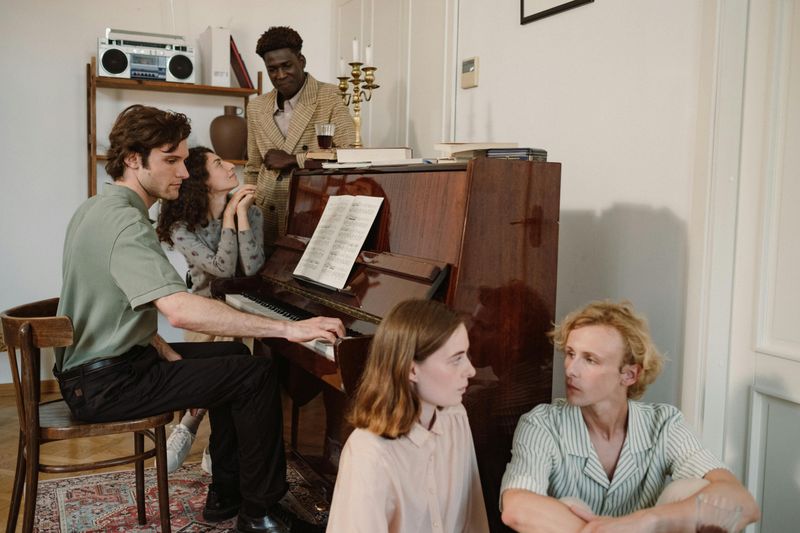12 Subtle Red Flags You’re Ignoring in Your Friend Group

Image Credit: © Yan Krukau / Pexels
Friendships should make you feel supported, valued, and happy. But sometimes, the people closest to us show signs that the relationship isn’t as healthy as it seems. These warning signals can be easy to miss, especially when you’ve known someone for years or when the issues feel too small to mention out loud.
1. You Always Feel Drained After Hanging Out

Genuine connections energize you, even when you’re physically tired from laughing too hard or staying up late. But emotional exhaustion tells a different story entirely. When every hangout session leaves you feeling like you need three days to recover mentally, your subconscious is sending you a message.
Real friendships shouldn’t require you to put on a performance or constantly guard your words. The weight you carry afterward might come from walking on eggshells, managing drama, or absorbing negativity that isn’t yours to hold. Your body keeps score even when your mind tries to rationalize the relationship.
Pay attention to how you feel during the drive home or the hours following your time together. Healthy friendships might tire your body, but they shouldn’t drain your spirit. If relief washes over you when plans get canceled, that’s your inner voice speaking loud and clear about what you really need.
2. They Downplay Your Successes

Celebrating wins together strengthens bonds and creates beautiful memories. True friends get genuinely excited when you land that promotion, finish that project, or finally achieve something you’ve worked toward for months. Their joy mirrors yours without hidden agendas or forced smiles that don’t reach their eyes.
Watch for reactions that feel lukewarm or comments designed to minimize what you’ve accomplished. Phrases like “must be nice” or “it’s not that big of a deal” wrapped in casual tones reveal underlying resentment. Some people can’t handle seeing others shine because it reminds them of their own insecurities or stalled progress.
Jealousy disguised as humor cuts deeper than outright criticism because it makes you question whether you’re being too sensitive.
You’re not imagining things when someone consistently finds ways to redirect conversations away from your achievements. Friends who truly care will champion your victories as loudly as you celebrate theirs, without keeping score or feeling threatened.
3. You’re Always the Initiator

Relationships require effort from everyone involved, not just one person carrying the entire weight. When you’re constantly the one texting first, making plans, or checking in to see how everyone’s doing, the imbalance becomes glaring. Friendship shouldn’t feel like you’re pulling teeth just to maintain basic contact with people who claim to care.
Notice how often others reach out when you stop initiating. The silence that follows can be deafening and incredibly telling about where you actually stand in their priorities. People make time for what matters to them, and consistent one-sided effort reveals that you’re investing far more than you’re receiving in return.
This pattern creates exhaustion and resentment over time because you’re essentially managing the entire relationship alone. Real connections flow naturally with give and take from all sides. If you disappeared tomorrow, would they even notice before weeks passed? That answer tells you everything you need to know about the friendship’s true foundation.
4. They Gossip About Each Other

Listen carefully when someone shares stories about mutual friends who aren’t present. The way people talk about others when they’re not around reveals exactly how they’ll discuss you behind closed doors. Gossip creates a toxic environment where trust becomes impossible and everyone constantly wonders what’s being said about them.
Groups that thrive on drama and sharing secrets aren’t building genuine connections. They’re creating entertainment at each other’s expense while pretending everything’s fine to everyone’s face. This behavior shows a fundamental lack of respect and loyalty that poisons the entire dynamic from within.
You might feel temporarily included when they share juicy details about someone else’s struggles or mistakes. But that false sense of closeness comes with a price tag you’ll eventually pay yourself.
Healthy friend groups protect each other’s privacy and address concerns directly rather than turning personal information into group discussion topics. If they gossip with you, they absolutely gossip about you too.
5. They Make Subtle Digs Disguised as Jokes

Humor brings people together and creates inside jokes that strengthen bonds over time. But there’s a clear difference between laughing with someone and laughing at them, even when the person making the joke insists they’re just kidding around. Comments targeting your appearance, choices, or insecurities aren’t funny—they’re calculated attacks wrapped in plausible deniability.
Notice how these “jokes” make you feel small or embarrassed, especially in front of others who join in the laughter. The person delivers the dig with a smile, then acts shocked if you express hurt, turning the situation around to make you seem overly sensitive. This manipulation tactic allows them to be cruel while avoiding accountability.
Real friends build you up rather than tearing you down for entertainment value. They know your sensitive spots and carefully avoid them instead of exploiting them for laughs.
When someone repeatedly makes you the punchline despite your discomfort, believe their actions over their claims that they’re “just joking.”
6. You Can’t Be Fully Honest With Them

Authentic friendships create safe spaces where you can share your real thoughts without fear of judgment or backlash.
When you constantly filter your words, hide your true feelings, or avoid certain topics to keep the peace, something fundamental is broken in the relationship’s foundation. Walking on eggshells becomes exhausting when you can never fully relax into being yourself.
Maybe you’ve learned that certain opinions trigger arguments or that expressing vulnerability gets used against you later. Perhaps your feelings get dismissed or minimized so often that sharing them feels pointless. This emotional censorship slowly erodes your sense of self because you’re performing a version of yourself rather than showing up authentically.
True connection requires honesty, even when conversations get uncomfortable or opinions differ. Friends who genuinely care create environments where you feel heard and respected, not judged or attacked.
If you’re constantly calculating what’s safe to say, you’re not in a friendship—you’re managing a relationship that doesn’t have room for the real you.
7. They Only Show Up When It’s Convenient

Fair-weather friends reveal their true colors during your difficult seasons. These people enthusiastically join you for parties, celebrations, and fun adventures but mysteriously disappear when you’re going through hardships or need genuine support. Their presence depends entirely on what they can get from the interaction rather than mutual care and commitment.
You’ve probably noticed they’re always available for the good times but suddenly become too busy when you’re struggling.
Phone calls go unanswered during your crisis, but they expect you to drop everything when they need something. This conditional loyalty shows they view the friendship as entertainment rather than a meaningful connection worth maintaining through ups and downs.
Real friends show up especially when things get messy, uncomfortable, or inconvenient. They sit with you in the hard moments without checking their watch or making excuses to leave early. Relationships built only on convenience crumble the moment they require actual effort, leaving you alone precisely when you need people most.
8. You Feel More Anxious Than Comfortable Around Them

Your nervous system knows the truth before your brain catches up. When anxiety spikes around people who supposedly care about you, your body is warning you that something isn’t right in this dynamic. Constantly second-guessing your words, worrying about judgment, or feeling tense in their presence signals that psychological safety doesn’t exist here.
Healthy friendships allow you to breathe easy and let your guard down completely. You shouldn’t need to rehearse conversations in your head or replay interactions afterward, analyzing every word for potential mistakes. This hypervigilance exhausts your mental energy and prevents genuine connection from forming because you’re too busy protecting yourself to actually be present.
Trust your gut when it tells you something feels off, even if you can’t pinpoint exactly what’s wrong. Friends who make you feel comfortable in your own skin, who accept your quirks and don’t weaponize your vulnerabilities, create spaces where anxiety fades rather than intensifies.
If you’re constantly walking on eggshells, listen to what your intuition is desperately trying to communicate.
9. Plans Always Revolve Around Their Schedule

Balance matters in every healthy relationship, including when and how you spend time together. When one person’s schedule, preferences, and needs consistently take priority over everyone else’s, it creates an unhealthy power dynamic.
You find yourself constantly adjusting your plans, canceling commitments, or rearranging your life to accommodate their availability while receiving no flexibility in return.
This pattern shows a lack of respect for your time and priorities. They expect you to be available whenever suits them but can’t seem to work around your schedule or make compromises. Maybe they cancel last-minute frequently but get upset if you need to reschedule, or they choose activities based solely on their interests without considering what you enjoy.
Mutual respect means taking turns choosing activities and finding times that work for everyone involved. Friends who value you will make genuine efforts to meet you halfway rather than expecting you to orbit around their world.
When someone consistently treats their time as more valuable than yours, they’re showing you exactly how much they actually prioritize the friendship.
10. They Compete With You Instead of Supporting You

Friendship should never feel like a competition where someone needs to win and someone needs to lose. When every conversation turns into a comparison game or your friend constantly tries to one-up your experiences, it reveals deep insecurity masquerading as connection.
They can’t celebrate your wins because they’re too busy measuring themselves against you and coming up short in their own minds.
This competitive energy shows up in subtle ways that make you question whether you’re being paranoid. They might rush to share their own similar experience before acknowledging yours, minimize your achievements to highlight their own, or suddenly pursue the same goals you’ve mentioned. Everything becomes a race they didn’t tell you that you were running.
Genuine friends understand that your success doesn’t diminish theirs and vice versa. They cheer for you without keeping score or feeling threatened by your growth. When someone views your friendship through a competitive lens, they’re more focused on their ego than building authentic connection.
Healthy relationships have room for everyone to shine without anyone feeling overshadowed or diminished.
11. Your Boundaries Get Ignored or Mocked

Setting boundaries is essential for maintaining healthy relationships and protecting your mental health. When friends consistently ignore, dismiss, or make fun of your limits, they’re showing blatant disrespect for your needs and autonomy.
Whether you’ve asked them not to share certain information, to respect your time, or to avoid specific topics, repeatedly crossing those lines isn’t accidental—it’s intentional.
Watch how they react when you assert yourself or say no to something. Do they guilt-trip you, call you sensitive, or pressure you until you cave?
Friends who truly care will respect your boundaries even when they don’t fully understand them. They’ll adjust their behavior because your comfort matters more than their temporary inconvenience or desire to have things their way.
Boundaries aren’t walls meant to keep people out—they’re guidelines that protect the relationship’s health. When someone mocks your limits or treats them as suggestions rather than requirements, they’re telling you that their wants matter more than your wellbeing. Real friendship honors boundaries because it values the person behind them.
12. You’re Expected to Be Their Free Therapist

Supporting friends through difficult times is part of caring relationships, but there’s a difference between being supportive and becoming someone’s unpaid therapist.
When a friend constantly dumps their problems on you without reciprocation, appropriate boundaries, or consideration for your emotional capacity, they’re using you as an emotional dumping ground rather than treating you as an equal.
These interactions leave you feeling depleted because they’re entirely one-sided. They call or text whenever they need to vent, often at inconvenient times, expecting you to drop everything and absorb their stress.
But when you need support, they’re unavailable, dismissive, or quickly redirect the conversation back to themselves. Your role becomes listener and advice-giver with no room for your own needs.
Healthy friendships involve mutual support where both people give and receive emotional care. While everyone goes through seasons of needing extra help, consistently being someone’s crisis manager without reciprocity isn’t friendship—it’s exploitation.
You can care about someone deeply while recognizing that you’re not equipped or obligated to be their sole source of emotional support.

Comments
Loading…